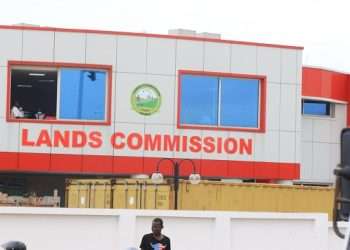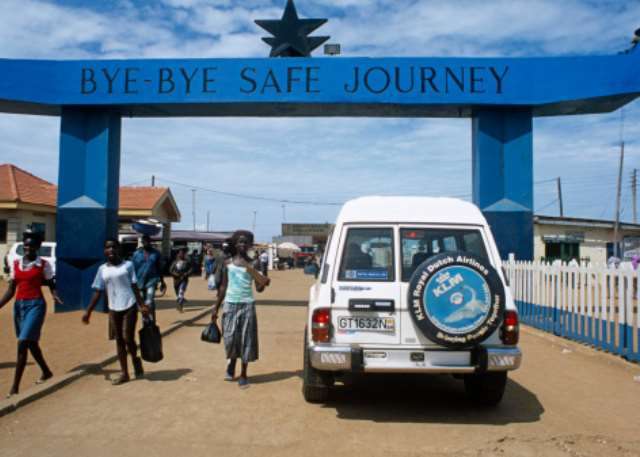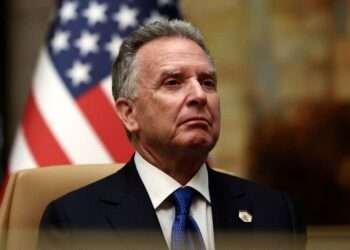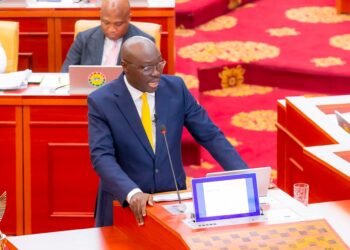In a significant move under Ghana’s Reset Agenda, the government has announced a nationwide expansion of land services, signaling its intention to decentralize the Lands Commission’s operations.
As part of the drive to bring the land administration services closer to citizens, Minister for Lands and Natural Resources, Hon. Emmanuel Kofi Armah Buah, revealed that 90 district offices have been identified across underserved areas to host the Lands Commission.
Speaking at the Government Accountability Series on July 23, 2025, Minister Buah explained that the target is to ensure each district in the country will have a fully functioning Lands Commission office by the close of the year.
“This initiative aims at bringing land services closer to citizens, reducing congestion at regional offices, and strengthening land governance at the local level. In addition, the Lands Commission is working towards a turnaround time for the completion of all applications within 30 days.”
Hon. Emmanuel Kofi Armah Buah
Hon. Buah highlighted that the Ministry has set up a dedicated committee to carry out an in-depth assessment of all public land allocations.
The goal, he noted, is to promote greater transparency, ensure accountability, and align land distribution with the country’s broader development goals. “The committee is expected to turn in its report in August 2025.”
Alongside these efforts, the ministry is working on enacting a Legislative Instrument to fully operationalize the Land Act 2020 (Act 1036). The draft instrument is currently under review by the Attorney General’s Department.

Meanwhile, a revision of the 1999 National Land Policy is underway to ensure alignment with international land governance standards.
This process is being guided by extensive stakeholder engagement and expert consultations, with the updated policy expected by December 2025.
A key part of the government’s digitalization strategy involves close collaboration between the Lands Commission, the Land Use and Spatial Planning Authority (LUSPA), and the Ministry of Local Government, Chieftaincy, and Religious Affairs.
This collaboration aims to incorporate local spatial plans as foundational maps for land registration activities.
Digitization Enhances Land Services System Transparency
In the digital domain, the government has enhanced the Enterprise Land Information System (ELIS), which will soon be deployed in all 16 regions.
According to Hon. Kofi Buah, the platform is designed to promote accountability, transparency, and ease of access to vital land information, such as processes, fees, and permit statuses.
In another digital upgrade, a QR code verification system has been introduced to authenticate site plans. This feature also provides address verification and is aimed at significantly cutting down the time it takes to register land.

“The Office of the Administrator of Stool Lands (OASL) has engaged with 548 communities, including traditional authorities, clan heads, and District Assemblies, to address challenges affecting revenue mobilization. As of June 2025, the agency had mobilized and disbursed GHS 63.8 million.”
Hon. Emmanuel Kofi Armah Buah
In addition, the OASL has documented around 1,000 land rights to support the establishment of Customary Land Secretariats, an initiative that is expected to further improve local revenue collection mechanisms.
Meanwhile, the Ghana Boundary Commission has embarked on a wide-ranging mapping and security exercise. The Commission has completed orthophoto mapping for a 150km boundary reaffirmation project along the Ghana-Côte d’Ivoire border.
A similar effort is being carried out with Togo, spanning a 350km stretch. These projects aim to combat cross-border crimes such as smuggling and irregular migration.

On the maritime front, Ghana has concluded four joint maritime boundary inspections with Côte d’Ivoire. These inspections confirmed compliance with international boundaries and provided updated geospatial data to aid in future demarcation efforts.
As part of a broader security and development framework, the Ghana Boundary Commission has also executed Phase II of the Mitigation of Destabilising Effects of Transnational Organised Crime Project.
The initiative has reached over 4,600 residents across 20 border communities in the Upper West and Savannah regions.
Its primary goals are “to address transnational organised crime and promote sustainable livelihoods in border communities through skills training and sensitization initiatives.
With these initiatives, the Ministry of Lands and Natural Resources appears focused not only on improving service delivery through decentralization and digital innovation but also on enhancing border security and economic resilience in local communities.
If fully implemented, these reforms promise to reshape the landscape of land services across the country, making them more accessible, efficient, and transparent.
READ ALSO: FTA With UK Worries Indian Whisky Makers




















